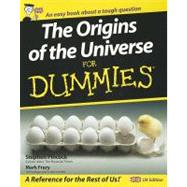
What is included with this book?
Mark Frary is a science and technology writer. He studied astronomy and physics at University College London, writing a dissertation on the production of positronium. While there, he worked at the Mullard Space Science Laboratory on atmospheric plasma physics. After completing his degree, he moved to Geneva and worked on the OPAL experiment at the European particle physics laboratory CERN.
Mark co-wrote the book You Call This The Future?, a look at the 50 best sciencefiction gadgets ever conceived and how they have become reality. He lives in Ampthill in Bedfordshire with his wife and two children.
Mark and Stephen are the authors of Codebreaker: The History of Secret Communication.
The New copy of this book will include any supplemental materials advertised. Please check the title of the book to determine if it should include any access cards, study guides, lab manuals, CDs, etc.
The Used, Rental and eBook copies of this book are not guaranteed to include any supplemental materials. Typically, only the book itself is included. This is true even if the title states it includes any access cards, study guides, lab manuals, CDs, etc.